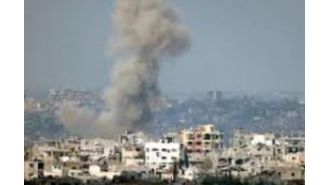Delhi air polluted, air quality in 'severe' zone; check AQI for updates.

The air quality in New Delhi has taken a drastic turn for the worse in recent days. The Central Pollution Control Board (CPCB) informed that the Air Quality Index (AQI) in the national capital remained in the 'severe' category on Wednesday. Data shared by the CPCB showed that the AQI in Anand Vihar was recorded at 452, while it was at 433, 460, 382, and 413 at RK Puram, Punjabi Bagh, Sri Aurobindo Marg and Shadipur.
Residents of the city have voiced their concerns over the deteriorating air quality, and the impact it has had on their health. One commuter told ANI, "This toxic air is giving us breathing problems. The government should mobilise urgent steps to bring us some respite." Gulab Singh Shukla, another resident, said, "The deteriorating air quality is proving to be a public health hazard. The government should act at the earliest." Jatin, a cyclist, added, "The air pollution is getting worse and people are literally struggling to breathe. The government and all agencies concerned should take note of our problems and announce further steps to curb pollution."
The governments of the northern states have been trading blame and pointing fingers at each other instead of taking steps to control the pollution. Satish Mishra, another resident, said, "If not controlled now, this could have a more severe impact on public health than Covid. Masks are back on the faces of residents here as the air quality is going from bad to worse."
The Supreme Court of India expressed grave concern over the hazardous air quality in the national capital, and directed that farmers should stop stubble burning forthwith in Punjab, Haryana, and western Uttar Pradesh. It also directed that a meeting be held between the states to ensure that crop burning is stopped forthwith. The top court noted that smog towers installed as per an earlier order are not working and directed the government to ensure they are repaired.
Various schemes like odd-even for vehicles have been put in place to tackle pollution issues, but these are mere optics. Air pollution levels can be high during the winter months due to dust and vehicular pollution, dry-cold weather, stubble burning, burning crop residues after the harvest season, and commuting. Cold air is denser and moves slower than warm air, so it traps pollution and doesn't whisk it away.
Doctors recommend that the AQI should be less than 50 for any healthy person, but these days the AQI has spiked beyond 400, which could prove fatal for those suffering from lung-related diseases and even pose a risk of lung cancer. Meanwhile, the air quality index in Prayagraj district in neighbouring Uttar Pradesh, slipped to the 'poor' category on Wednesday. IIT Kanpur has even suggested artificial rain showers to give respite to Delhi.
1 Views










